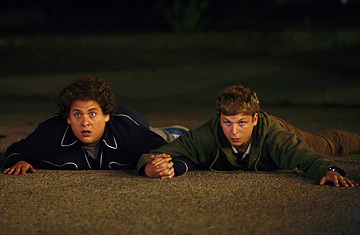
Seth, played by Jonah Hill (left), and Evan, Michael Cera, in Superbad.
(3 of 3)
Somewhere buried in Superbad is the poignant coming-of-age fable — the glimmer of a suggestion that Seth's dependence on Evan is adolescent, even infantile, and that at some point he has to grow up and accept that friends can be a continent apart and still be close. Or not close: friendships, like erections, can subside. But to find that valuable truth, you have to dig through an avalanche of d--- jokes and strenuous slapstick.
Anyway, I'm glad the movie exists, because it has a fabulous performance by Mintz-Plasse, a first-time movie actor with a beguiling, almost cunning dorkishness. The comedy comes from Fogell's belief that he is somehow cool, though he must have been told the opposite three times a day since he was in pre-school. Apatow has a habit of promoting his featured losers to starring roles. Rogen was one of Steve Carell's friend-torturers in The 40-Year-Old Virgin before getting Knocked Up, and Hill was a Rogen buddy in that film before Superbad. From this natural selection of the lamest, Mintz-Plasse has proved he merits a full-length Fogell feature.
MEN WITHOUT WOMEN
School comedies from as far back as Harold Lloyd's The Freshman in 1925 set up the basic conflict of nerd vs. jock. The athlete was seen as stuck-up, taking adulation as his due, knowing "you gotta be a football hero to win the love of a beautiful girl." So virtually every high school or college comedy dramatized the triumph of the outsider against the sportsman establishment. In 1989, Heathers lifted that vengefulness to a tragicomic delirium.
In Superbad and other contemporary school movies, the misfit heroes are usually mocked or brutalized by the athletes. Well, it's true that the nerds' main form of exercise is masturbation, but they are every bit as competitive as the towel-snapping guys on the football team. The difference is that their aggression is verbal, not physical. Instead of wanting to score the winning touchdown, they want to top their friends in the display of ribald wit. They're joke jocks. And since they don't think girls are funny (their touchstone movie "classics" are Caddyshack and Porky's, not Earth Girls Are Easy and Clueless), and since the jokes they make often have a pretty deep misogynist streak, they play to the one audience they think will appreciate them: their male friends, which is to say, themselves. To each his Onan.
In this all-guy world, girls are the mysterious Other — which, from my teen recollections, sounds about right. But they are only the goal: get the girl because of the challenge. They are not only unknowable, they're hardly worth knowing. They're a treat to see swinging their hips as they pass the misfits; but they don't understand the guy game, which is to assert domination by being rudely clever. They can walk the walk but they can't talk the talk.
Being long past my youth, I can't say if this is sociologically accurate. But males and females not charming and testing one another by talking — that's a big change from the best old movies.
It was clear as long ago as the late 80s, and When Harry Met Sally (not Larry) that talk was the new sex. But in that film Meg Ryan got laughs by faking an orgasm. If you go back to some of the great romantic comedies of the 30s and 40s — Bombshell, The Awful Truth, The Women, Midnight, Ball of Fire, The Lady Eve, Adam's Rib — you'll see that women got to be at least as witty as the men, and that was very witty indeed. And it wasn't only male writers inventing funny things for actresses to say; some of these films were written by women (as was When Harry Met Sally).
Hollywood thinks girls aren't funny any more. Today, smart or sassy talk is something only the guys get to do. In The 40-Year-Old Virgin the main attraction of the female romantic interest played by Catherine Keener is that she laughs at Carell's jokes. The Apatow dictum (ha-ha, I said dictum) is that women can't aspire to equality in cracking jokes, but guys will indulge them and let them be the receptive audience.
Which is about all that's left for female moviegoers to do. Except for the months from December to February, when the tonier Oscar hopefuls allow some good roles for actresses, women have practically disappeared from movies. A decade ago, when the teen audience had established itself as the dominant box office demographic, producers scrambled to "young down" their projects, casting actors in their 20s for roles written for characters in their 30s and 40s. Now, I wonder, are producers "guying up" their movies? Are they having romantic comedy and drama scripts rewritten from guy-girl to guy-guy?
I mean — subtextually, of course — gay-gay.
